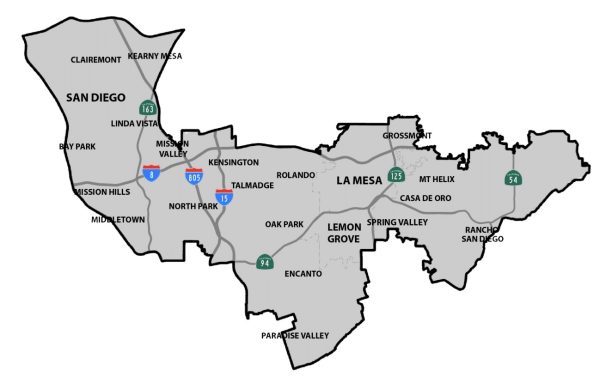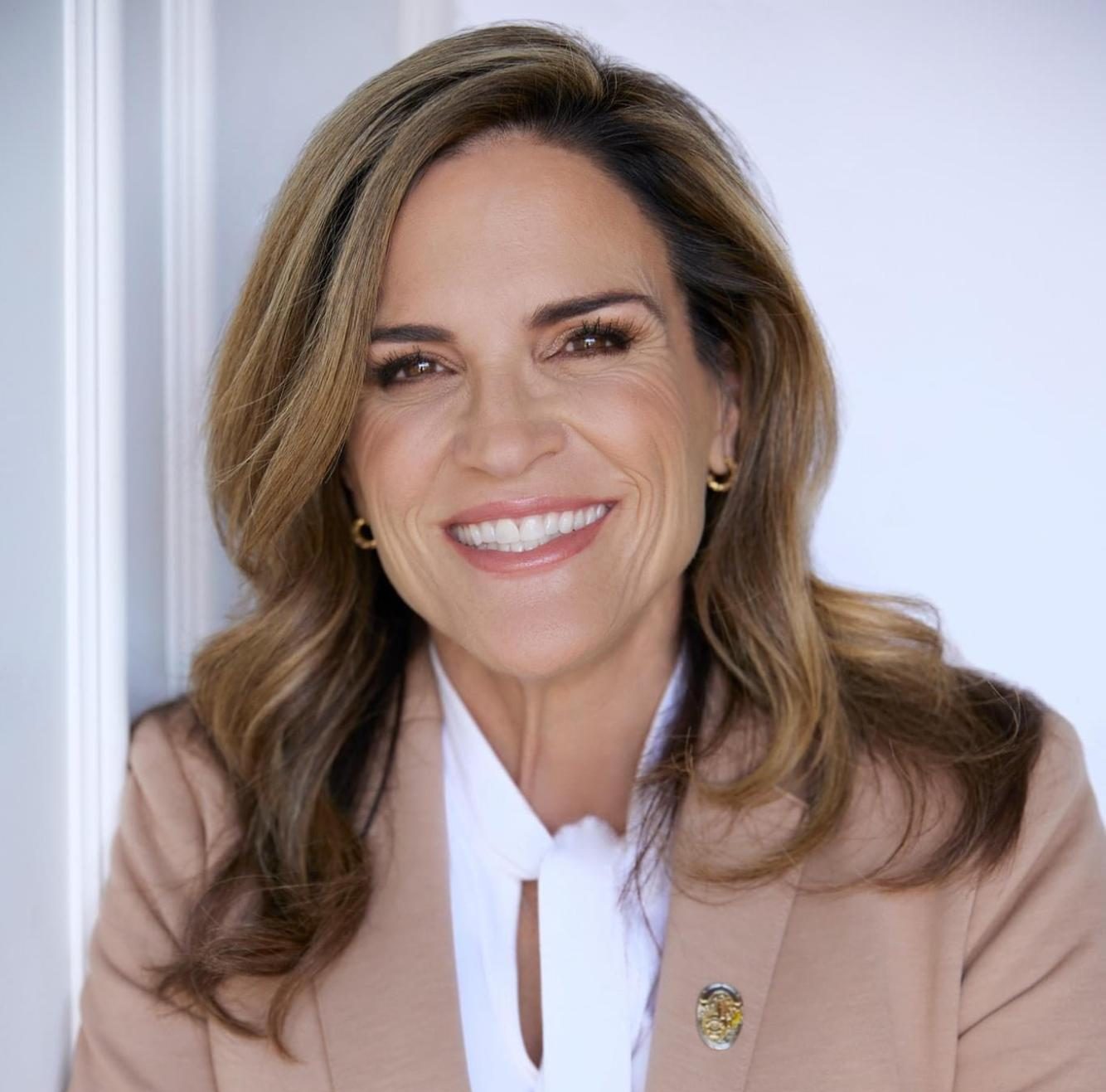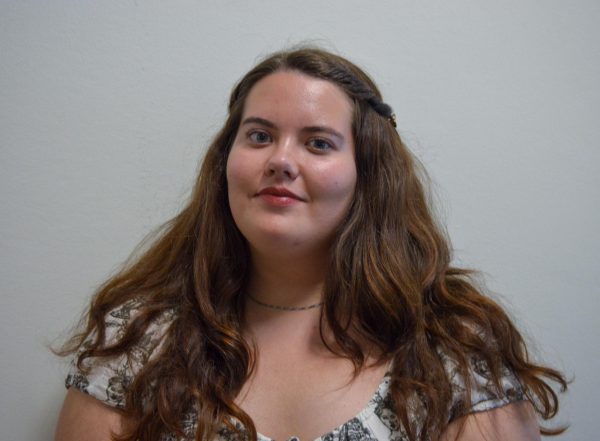Voters located in San Diego County’s District 4 will be heading to the polls on Nov. 7 to elect a new supervisor to fulfill the current term ending in 2027, following the resignation of former supervisor Nathan Fletcher back in May.
District 4 comprises parts of the city of San Diego, such as the College Area, Mission Valley, Encanto and Clairemont, as well as cities like Lemon Grove, La Mesa, Spring Valley and Rancho San Diego. Over 675,000 San Diego County residents reside in the district.

(Map courtesy of the County of San Diego)
All registered voters residing within District 4 should have received a ballot in the mail within the past two weeks, however, voters can vote in person at certain voting locations listed on the Registrar of Voters website.
The San Diego County Board of Supervisors functions as the county’s primary legislative and governing body. Essential state and federally funded programs such as MediCal and CalFresh are administered by the board of supervisors. The board also holds jurisdiction over the county’s unincorporated areas, or areas without an elected mayor or city council.
The Board of Supervisors also oversees and approves the county budget, as well as the budgets of the San Diego County Sheriffs and the county District Attorney’s office.
Following the primary election on Aug. 15, 2023, the two top candidates, Monica Montgomery Steppe and Amy Reichert will now go head-to-head in a runoff election.
Reichert is a private investigator and non-profit founder, making her second run for the District 4 seat after losing to Nathan Fletcher in the general election last year. Reichert graduated from San Diego State with a degree in political science, and she currently lives in La Mesa with her husband and sons.
The Daily Aztec asked both candidates for District 4 supervisor a series of questions about their plans and priorities. Their answers have been edited for length, clarity and style.
Give us a summary of your background. Who is Amy Reichert?
“I was raised right here in San Diego, my mom was a secretary and my dad was a clerk at Fed Mart. Very blue collar, middle class upbringing. When I was 8 years old, my dad was diagnosed with multiple sclerosis. My dad loved his job, but they would not allow him to have a stool and so he lost his job. That’s when my mom became the caregiver and the breadwinner for me and my two younger brothers.
I was adopted when I was a baby. When I was 25, my mom told me my biological mother’s real name. That’s when I looked for her and I found her — this was before Google. After that, I was like, “You know what, I think I could do this as some kind of career. So, I got my license as a private investigator in 1999 and I’ve owned Amy Reichert Investigations since 2004.
I married my high school sweetheart. When I was pregnant with our first child, my dad who was only 56 years old, died of complications from multiple sclerosis.
Five weeks later, after an uncomplicated pregnancy, my daughter Ashley was born a week overdue, and she only lived for three days in the NICU. That’s one of the reasons why mental health is such a core issue for me in this platform for supervisor because I myself know what it’s like to experience a crisis. I was diagnosed with major depression and post traumatic stress disorder. And I’m very, very fortunate that I was able to get the help that I needed to recover stronger.
In late 2020, I started speaking up for the safe reopening of schools and for businesses. I’m the founder of ReOpened San Diego, and we went on to become a legitimate 501 C3 nonprofit. And that’s really where I found my voice. I just got to the point where I couldn’t stay silent anymore.”
You ran for this seat last year and lost to Nathan Fletcher. Why are you running again for the District 4 seat?
“When I challenged him, I felt called to it. (Fletcher) was extremely divisive. During COVID, instead of bringing people together, he used it for political power, and to name call and divide. So I knew in my gut that he was just not a good guy. When he wound up resigning, under allegations of sexual assault, it really wasn’t a shock or a surprise to me.
And so here we are.
We have an opportunity for a special election and I have a different ‘why’ now. It doesn’t matter if it’s a Republican or a Democrat, or no party preference. Everyone is telling me that they’re not happy with the course of the city of San Diego and of the county with inflation, cost of living, housing, our homeless crisis — there’s not one thing that anybody can point to and say ‘San Diego has gotten better over the past few years.’
So I’m running. And yes, it’s an uphill battle. This district is 49% Democrat. It is 19% Republican. It’s 30% no-party preference. This definitely shouldn’t be a partisan race. I’ve been sticking to the issues and I made a personal vow never to name-call or mudsling. I can tell you just on the ground talking with people. People are very frustrated. People are leaving the state, they’re thinking of leaving the state. They want a better quality of life. People are frustrated. People feel powerless.”
Although this is a nonpartisan office, the current board has two Democrats and two Republicans. Regardless of who is elected, the balance will be flipped. What are the areas, if any, where you believe you can find common ground to work across the aisle, and where might you draw a line?
“I’m not only endorsed by the Republican Party, but I’m also endorsed by the San Diego Libertarian Party. So my core values are our community, the Constitution, obviously, with my background of filing a federal lawsuit and winning over constitutional issues, and protecting workers rights. Protecting people is something that’s really important to me. I would say, if there’s one thing that you could point to that I am conservative, I am fiscally conservative.
I have vowed not to be partisan, we have serious issues that we have to focus on. The Board of Supervisors actually has consensus on a lot of things that are really important to San Diego County, for example, there was a unanimous vote over what’s going on at the border. I was very happy to see that they were able to come together and stand up to the federal government and demand aid.”
What are your priorities for District 4?
“There are two huge issues facing San Diego County right now that I hear over and over. We have this cost of living crisis. It’s never been this bad. Since 2020, 50,000 people have actually left the county, according to county data to which the population has declined.
I think that the government is really in the way of the cost of living. Just last week, the city council of San Diego passed a 20% water increase over the past for the next two years. We have the highest utility rates in the nation. I would stand up to SDG&E. I would stand up to the California Public Utilities Commission. We have $7 gas. We also pay the highest gas tax in the nation. This is ridiculous. It’s just maddening. So it’s really going to take the political will of our elected officials to stand up to Sacramento and Washington, D.C., and to stand up against the big corporations that are doing this to us, too.
I’ve heard my opponents say that she wants to do rent subsidies. I would love for the government to have this endless supply of money to be able to give rent subsidies. I was once a single mom, raising my kids in this county. I know what it was like.
Back in 2006, the corporate apartment complex I was renting from raised my rent by $250 a month when I wanted to renew. I wound up moving in with another single mom and I wound up sharing a room with my son. According to the county, San Diego, we have 400,000 County residents that are severely rent burdened. I did the math. Well, what if we could do like $100 a month rent subsidy for 14,000 people? It’s just not possible. And $100? Let’s face it, that’s nothing. Then what happens when the rent is raised again? The other solution that my opponent supports is rent control. And there’s unintended consequences for rent control.
We need other solutions, and I would like the government to stop taking so much of our hard earned money out of our pocketbooks.”
For these next two questions, we asked the SDSU community what issues are important to them. First, is safety. People around San Diego county have reported feeling increasingly unsafe as violent crime rises. What should the county be doing in response to this?
“Right now, our Sheriff’s Department is short staffed by 250 deputies. We have sheriff’s deputies that are working 16-18 hours overtime a week. They’re burnt out. A lot of them are retiring early. They’re missing their families and events.
Meanwhile, we’ve got a mental health crisis in our jails, because at any given time, roughly 30% of our inmates are on psychotropic drugs. We’re seeing that San Diego County has a horrible track record in inmate deaths because our jails aren’t built or staffed to be able to treat people that are severely mentally ill. They’re being put in situations where they’re committing suicide, or overdosing, and that’s what’s going on in our jails.
I will say it’s absolutely important that we hold systems accountable. If they are racist, or oppress people, or deny people their civil rights, then we have to hold them accountable. Over the past few years, there’s been a huge ‘defund the police’ movement. Many good officers feel that they are being lumped in with the bad, making it really hard to recruit.
Currently, the San Diego Police Department is also short staffed by 250 cops.
That’s why I’m so glad that ReOpened San Diego was able to step in and save their jobs because public safety would be so worse off right now if we had lost them over vaccine mandates. The San Diego Police Officers Association gave me a badge pin and also an honorary badge patch to thank me for helping to save their jobs.
I think that moving forward, when it comes to public safety, we need to be able to recruit good law enforcement, and we need to be able to keep them. We also need to hold people accountable if they’re committing violent crimes. We’ve seen in the past few years that people who aren’t committing crime aren’t being held accountable.”
Homelessness is a persistent issue in the county, even though it is one of the biggest spending categories for the county. What more should be done to combat homelessness in the county?
“Homelessness is multifaceted. It’s complex. It’s heartbreaking. There are no easy answers. The homeless population is not a monolith. There are different segments. There’s the elderly, the disabled, domestic violence victims, foster care youth who age out of the system and LGBTQ+ kids who are thrown out of their homes.
The encampments are what really concerns people. It’s because the issue is so heartbreaking and it’s a public safety issue as well. There are businesses that have to keep their doors locked during business hours. There are encampments on sidewalks, blocking public access to them and in our parks. I do not believe that it is compassionate to allow people to sleep and die in our streets.
Our jails were not built, nor are they staffed for people who are mentally ill or facing addiction. They’re dying there. And in a free society, a free compassionate society, we have to take a more rehabilitative approach.
For that population, the chronic homeless, the ones that are committing crime, or that are severely mentally ill or severely addicted, there should be mandatory treatment. People do not have a right to openly do drugs on the street. Just last year, 588 homeless people died on our streets, which is a six-fold increase since 2012. So clearly, what we’re doing is not working.
My plan is to shelter first with treatment. I think if we started there, with just the segment that is committing serious crime, you would see a massive improvement with the homeless encampments immediately.
It’s not compassionate to allow people to sleep and die in our streets.”
How would you repair trust with District 4 constituents following Nathan Fletcher’s tumultuous resignation?
“People lost trust in Fletcher before he resigned.
People would go to the Board of Supervisors and wait all day for their agenda items to be called, and they would only get two minutes to address the board. (Fletcher) wouldn’t even make eye contact with people. Instead, he was texting and tweeting about his own constituents.
So here’s something that I would do: ban the use of cell phones at Board of Supervisors meetings. Board of Supervisors, if you’re going to be professional and represent the people, the people deserve eye contact from you.
Also, listen to the people that have taken the day off to come speak to you, whether you agree with them or not. I think it also comes down to the fact that sadly, sometimes elected leaders only serve their own political party or interests. I think that’s wrong. You’re put there to serve everybody. So that’s how I would lead, I would serve the people and I would serve everybody.”
Finally, what do you want the SDSU community to know about you and/or your goals if you are elected to the District 4 seat?
“When I decided to start speaking up again in 2020, I was a nobody. Good. I remember just feeling kind of depressed about how the lockdowns were extending and they were continuing to go on. But, I put another emotion to it.
I realized I was feeling powerless.
And in that moment, I saw a young me as a student at San Diego State saying to 2020 me, ‘Hey, I thought when we got older, we would do something. We would stand up when the moment was right, and we would stand for what’s right.’
That was really eye opening, the optimism, the dreams, the ideals that I had, as a wide eyed San Diego State student who thought she could change the world. I’ll just tell any San Diego State student that’s reading this, you can absolutely change the world. Just have the courage to stand up for your convictions. If somebody calls you a name, just dust it off and keep going.”
To learn more about Amy Reichert or to get involved in her campaign, visit her official website.






